
Related
Guests
- Saree Makdisiprofessor of English and comparative literature at UCLA and the author of several books, including Palestine Inside Out: An Everyday Occupation.
The rival Palestinian political organizations, Fatah and Hamas, have reached an agreement to end a nearly five-year internal schism, form an interim government, and hold a general election within a year. The two sides have been locked in a bitter conflict since Fatah and the Bush administration tried to overthrow Gaza’s Hamas-led government in 2006 after Hamas won Palestinian national elections. Israel and the United States say they’ll reject any peace talks with a Palestinian government that includes Hamas. We speak with Saree Makdisi, professor of English and comparative literature at UCLA and the author of several books, including Palestine Inside Out: An Everyday Occupation. [includes rush transcript]
Transcript
JUAN GONZALEZ: The rival Palestinian political organizations, Fatah and Hamas, have reached an agreement to end a nearly five-year internal schism, form an interim government, and hold a general election within a year. The two sides have been locked in a bitter conflict since Fatah and the Bush administration tried to overthrow Gaza’s Hamas-led government in 2006, after Hamas won the Palestinian national elections.
The deal was announced at a news conference in Cairo on Wednesday, where the two negotiators referred to each other as brothers and declared a new chapter in the Palestinian struggle for independence. Azzam al-Ahmed headed the Fatah delegation.
AZZAM AL-AHMED: [translated] Today, we agreed on the appendix of full understanding on all points of discussions, which included in the articles of the Egyptian proposal. In addition, the idea of forming an interim, independent government with specific tasks has been added to the appendix, as my brother Abu Omar said. We agreed on the date of the elections, and we shared a discussion on the post-election status.
JUAN GONZALEZ: The agreement reportedly covers several major points of contention, including the formation of a transitional government, security arrangements, and the release of all prisoners with a non-criminal background. The agreement also calls for the restructuring of the Palestine Liberation Organization to allow Hamas to join it.
Israeli Prime Minister Benjamin Netanyahu responded by saying he would reject any peace negotiations with a government that includes Hamas.
PRIME MINISTER BENJAMIN NETANYAHU: [translated] The Palestinian Authority must choose either peace with Israel or peace with Hamas. There is no possibility for peace with both. Hamas aspires to destroy Israel. It has said so publicly. It fires rockets at our cities. It fires anti-tank missiles on our children. I think the idea of reconciliation shows the weakness of the Palestinian Authority and raises questions whether Hamas might take over Judea and the West Bank as it took over the Gaza Strip. I hope the Palestinian Authority will choose wisely, will choose peace with Israel. It is their choice.
JUAN GONZALEZ: In Washington, Tommy Vietor, a spokesperson for the National Security Council, said, quote, “The United States supports Palestinian reconciliation on terms which promote the cause of peace… Hamas, however, is a terrorist organization which targets civilians.”
AMY GOODMAN: To discuss these developments, we’re joined in Los Angeles by Saree Makdisi. He is a professor of English and comparative literature at UCLA, the author of several books, his latest called Palestine Inside Out: An Everyday Occupation.
Professor Makdisi, welcome to Democracy Now! Your reaction to this news conference yesterday, to the joining of Fatah and Hamas?
SAREE MAKDISI: I mean, I think, Amy, insofar as — you know, in and of itself, it’s an OK thing, because Palestinian unity in the face of Israeli occupation is obviously very important. The problem, though, is that the way people are talking about this in the mainstream media is — would lead one to think that there’s a normal country called Palestine, and there’s been kind of a split between two different rival factions, and now they’ve gotten together, there’s going to be elections, and a new government is going to be formed, and so on and so forth.
What’s missing from all this are two things. First of all, the territory that they’re talking about is under military occupation, both the Gaza Strip and the West Bank. And so, it’s not like a normal country where they’re now — you know, they’re going to have a minister of tourism and so on and so forth. The place is still under occupation. So, that’s the first really important thing.
The second equally, if not more, important thing is that, especially when they’re talking about elections, it’s important to remember that the West Bank and Gaza together amount to about 20 percent of historic Palestine, and only about 40 percent of the Palestinian people actually live in the Occupied Territories. So, this new government, insofar as it’s called that, and the prospect of elections only address the fraction of Palestine that’s under military occupation in the West Bank and Gaza and the minority Palestinians who actually live there. So, what about the majority Palestinians? What about those who have been in exile for 60 years? What about those who are living as second-class citizens inside Israel? Their rights aren’t addressed in this. Their interests aren’t addressed. And they’re completely excluded from all of this discussion. So I think it’s really important to reframe our approach to this question and start from that point of departure rather than from microscopically looking at Hamas and Fatah and making an arrangement and beginning with that.
JUAN GONZALEZ: But doesn’t this represent a major setback for both the U.S. foreign policy as well as the Israeli policy, which has been, for the past few years, to as much as possible isolate Hamas and seek to have them basically rejected by the Palestinian population, while propping up Fatah, and in effect, now, Fatah has rejected that and — because of how little has been accomplished in any kind of negotiations with the Israelis?
SAREE MAKDISI: I mean, the thing is, in terms of negotiations, the Israelis and Americans have been talking about negotiations for 20 years now, since Madrid in 1991, literally 20 years ago. And during all the period of negotiations, on and off, whether happily or not happily, what’s been accomplished? The number of Israeli settlers in the Occupied Territories has doubled or tripled, and there’s more building, more expropriation, more destruction of Palestinian homes, more killing of innocent civilians and so forth. So, actually — in fact, operationally, this doesn’t really make that much of a difference, in the sense that the Israelis are going to go on hemming and hawing and expropriating and building and demolishing and settling, and the Palestinians are going to have to figure out some other way to deal with this.
The real question is, what kind of support do Hamas and Fatah, between them, have among the Palestinian people, in general, not just those in the Occupied Territories? And then, also, to what extent can they claim to represent all Palestinians, not just the ones under occupation? To me, it’s not entirely clear — in fact, it’s not at all clear — how representative these two organizations are. More than that, more importantly than that, to go back to the question of negotiations, it seems quite clear from a Palestinian standpoint that two decades of negotiations have yielded absolutely nothing. So, Palestinians need to move to a new stage of their struggle. In fact, they already are moving to a new stage of their struggle. So the irony about this is that Palestinian civil society — that is to say neither Fatah nor Hamas, but Palestinian civil society organizations and individuals — have for the past several years been moving in a very new direction that has nothing to do either with Hamas or with Fatah, and that has to do with a series of nonviolent engagements with protests against the Israeli occupation, but also with renewed calls for equality for Palestinians living inside the state of Israel, who are subject to severe forms of discrimination and racism, and, of course, for the right of return of Palestinians who were forced into exile in 1948 and have never been allowed to return since.
So, the Palestinian struggle is not just a struggle against the occupation. The occupation is very important, but the Palestinian struggle is a struggle for the attainment of national and collective rights for all Palestinians. And really — it’s important to reiterate this — neither Fatah nor Hamas has a blueprint to attain the rights of all Palestinians. The negotiations, in whatever frame they were carried on, were always only about — insofar as they were about anything, which I think is doubtful, but if we give them the benefit of the doubt, they were about creating a little Palestinian state in parts of the West Bank, plus Gaza, plus maybe a sliver of East Jerusalem. That’s it. And that doesn’t address the rights of most Palestinians, and it doesn’t address the real heart of the struggle, which is the right of return of those who were exiled 60 years ago. I mean, I don’t want to go on repeating, but you see what I’m saying: it’s not about Fatah and Hamas; it’s about the larger struggle. And that can’t drop out of the picture, I think, in this kind of analysis.
JUAN GONZALEZ: Now, you’ve been very critical, obviously, of the move for the September vote in the General Assembly on the issue of Palestinian statehood, for these very reasons you’ve outlined. But how do the wishes of the majority of Palestinians, who are outside of the Occupied Territories — how are they organizationally, or in the real world, going to be manifested or expressed?
SAREE MAKDISI: That’s a really — that’s the key question, for the question of Palestine. But actually, on that regard, I think it’s important to look to the events of Tunis and Egypt and then across the Arab world in general. Palestinians are very much part of the sort of uprising, if you want to call it that, that’s taking place across the Arab world. And the part of the lesson of Egypt and Tunis is that huge change can be accomplished, against all the odds and against massively entrenched interests and powers, including the U.S., Israel, forms of government that are extremely repressive, and so forth, by popular mobilization that’s actually not centralized, not hierarchized. It’s spontaneous. It involves spontaneous action, networking among people and organizations and so forth, that has nothing to do with a central party hierarchy of the kind that Fatah and Hamas represent.
So, I want to reiterate that Palestinians have been working in this direction for some time now, and their struggles have been accelerating since the events in Egypt and Tunis. For example, there are planned demonstrations that will link at the border Palestinian refugees inside Lebanon with those on the inside of Israel itself. There’s networking that’s going on in terms of the Boycott, Divestment, Sanctions movement that’s taking place globally, that neither Fatah nor Hamas have anything to do with, but are extremely prominent. And then there’s, as I said, a network of Palestinian civil society organizations and individuals who are working to reunify the Palestinian people in one — in one sort of collective struggle that doesn’t depend on a kind of party structure that, as we’ve seen historically, is easily co-opted, subverted, bought off, assassinated, and so forth. And I think that’s a really, really important — it’s very important to reevaluate the Palestinian struggle in the context of what we’ve seen accomplished in Egypt and Tunis and other places across the Arab world. It’s not easy. And obviously your question points to the real — you know, the real, thorny problem. But it can be done. And that’s very, very important for all Palestinians to always remember: it can be done. We’ve seen it happen in Egypt and Tunis. There’s no reason Palestinians can’t do the same thing, against all the odds.
AMY GOODMAN: Professor Makdisi, do you think actually the division will continue in reality? I mean, will Hamas give up its sole control of Gaza; Fatah, the whole West Bank? What exactly will happen? And what do you think of the timing of this, and the U.S. rejecting this, saying it will deal with no one that involves Hamas?
SAREE MAKDISI: Well, I mean, the real question is, what forms of pressure will the outside world bring to bear? Based on what the Israelis and Americans have already said, it looks like there’s going to be — it’s going to go back to what it looked like in 2006, 2007, and so forth: massive pressure being brought to bear from the outside, sanctions — I don’t know — all kinds of things.
But what this reminds us of is, again, the need for Palestinians not to be bottled up and not to always find themselves on the wrong foot in responding to this kind of isolation. That’s why it’s more important than ever that Palestinians reach out and branch out beyond the Occupied Territories, as they are doing, and beyond Fatah and Hamas.
Now, you know, on the ground, who knows what’s going to happen? This is not the first time these two organizations have reached an agreement. The problem for both of them is that, as I said, they’re under occupation. So, what they can and cannot do operationally is extremely limited, given the realities on the ground, which is that they don’t control any territory, really. I mean, even Hamas in Gaza doesn’t really control Gaza, because Gaza is under Israeli occupation from the outside, and even more so on the West Bank. So, it’s not clear. And I just think it’s important to — not to rain on the parade exactly, but to take a reality check when talking about the situation and remember that there’s much more going on than just these two organizations signing their agreement.
AMY GOODMAN: Well, Professor Makdisi, we thank you very much for being with us. Saree Makdisi —
SAREE MAKDISI: My pleasure.
AMY GOODMAN: — professor of English and comparative literature at UCLA. His latest book, Palestine Inside Out: An Everyday Occupation.

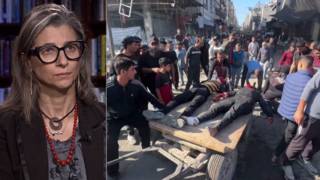
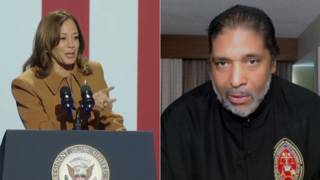

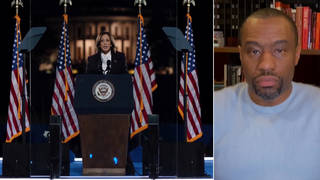



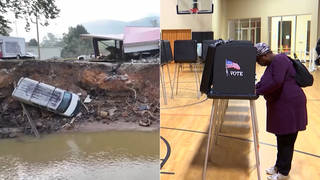

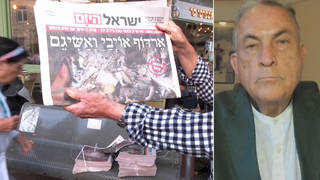


Media Options